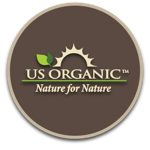Free shipping on Orders Over $9.99. (Exclude gallon size & Beeswax 20kg) *US Domestic Standard Shipping Only. (We may request or require a signature for any deliveries over $50. When shipping with Signature confirmation shipping option, it will be complimentary and the option will be paid by US Organic.) close
Order online or call us (800) 997 0605
